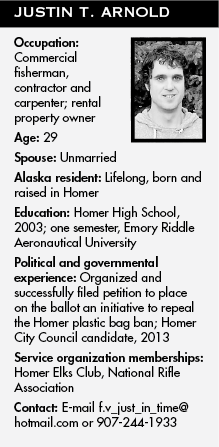In the 2013 city election, city council candidate Justin Arnold emerged 1-1 in his campaign. While he lost for council, finishing fourth in a field of four, a petition he organized to repeal a single-use plastic bag ban won 661 to 518 votes.
Arnold also called for a recount when third-place candidate Corbin Arno seemed to have won on election day, but fell behind 10 votes to incumbent council member Bryan Zak after absentee and other votes were counted. With Arno, Arnold again is taking a second try at the city council.
Arnold, 29, said he called for the recount “to show the electronic balloting machines aren’t as accurate as they say they are.” Arno picked up one vote in the recount. Arnold had demanded a hand recount, which the city’s lawyer allowed him to do for one precinct.
“They weren’t very cooperative in my doing a hand recount,” Arnold said. “They (the city council) even passed a law that I can’t do that, even though it’s against a state regulation.”
Born and raised in Homer and Anchor Point, Arnold graduated from Homer High School in 2003. He said he traces his Alaska roots back to the early families of Ninilchik. His parents are Julie Swisher, a city worker, and Lloyd Moore, a former Homer Advisory Planning Commissioner who also served on the Water-Sewer Rate Task Force. He credits his grandmother, Snooks Moore, with inspiring him to be politically active and also teaching him the fishing trade.
Arnold has been self-employed since age 18, when he bought the aluminum hull of his commercial fishing boat, the F/V Just In Time, and restored it from the ground up. By 22 he was fishing on his own. He now fishes the Bristol Bay red salmon fishery.
“It’s a silly thing, but it’s a profitable thing for young people to get into,” he said of fishing. “I’m very blessed.’
Off season, Arnold has a small, one-man construction company. He also owns a triplex and lives in one unit while renting out the other two units. During the debates in 2012 on the water-sewer rates, Arnold testified frequently as a rental property owner.
Arnold said he’s running again because he still believes he can help and can serve the city well.
“I can bring some good ideas in. It was a good learning experience last time,” he said. “The biggest thing I learned is any single one person can make a tremendous difference just by showing up.”
His small-business experience gives him a better perspective as a potential council member, he said.
“I think I understand running a balanced budget better than a lot of current council members and some of our current running mates,” Arnold said.
When he looks at big projects like the Spit and Pioneer Avenue restrooms, Arnold said he doesn’t consider that the money might have come from cruise ship taxes. He also mentioned the city’s $30,000 paid section in “North to the Future,” a glossy coffee table book.
“That was somebody’s hard-earned money that got taxed,” he said. “When you’re spending somebody else’s money, you should spend it more shrewdly than your own.”
Arnold said he doesn’t have a priority on his to-do list.
“What I would like to do is examine our current budget that they project and see what they’re going to spend,” he said. “I’d also like to find one silly law that shouldn’t be on the books.”
For his top budget priority, number one is “large new purchases, deciding the necessity of those,” he said.
He also supports police and fire protection, road maintenance and plowing, and sewer and water — the basics, he said.
If he had to cut the city budget, he said he’d look at things like the “North to the Future” book and engineering costs. Supporting the Homer Chamber of Commerce and Visitor Center is money well spent, though, he said.
Homer’s greatest strength is its diversity, Arnold said.
“We have people from every type of walk of life. The people who live in this town want to live in this town,” he said. “We love it.”
As for Homer’s greatest weakness, it’s an anti-business attitude, Arnold said. As an example, when a boat bay burned down at Northern Enterprises, his grandparents’ business, government regulations imposed on rebuilding pushed the cost up from an insured valued of $500,000 to a cost of $1.5 million.
“That’s an example of being very anti-development,” he said.
To address that weakness, Arnold said he’d like to see more public involvement, particularly of young people.
“I’ve seen (Homer) change in a lot of good ways and a lot of negative ways,” he said. “I’d like to take it back to the basics and make it a good place for my kids to live in, for everyone’s kids and grandkids to call home like we’ve been blessed to.”
Michael Armstrong can be reached at michael.armstrong@homernews.com.
Arnold: Would take hard look at budget


